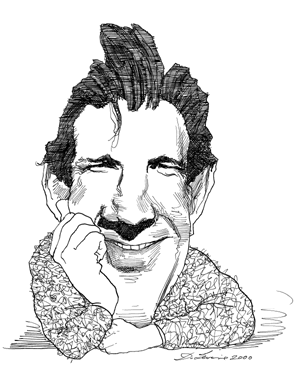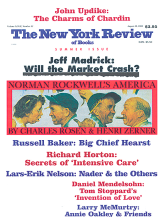Walking through the center of Krakow. The narrow medieval streets leading to the Old Market, the shifting perspectives, the nervous rhythm of the rooftops—all joined to form the blood vessels of a living, organic system. You could circle the old city center by way of the Planty gardens in an hour or less. Church steeples, white or blood-red, pierced the vast canopies of chestnuts, maples, ashes; they towered above the foliage like grownups hovering watchfully over their young in family photographs. Days and weeks went by when my mind was taken up by completely mundane matters:Will I get credit for history of philosophy, have I got enough money for both concerts and lunches, does my girlfriend still remember me? But sometimes, at odd moments, it seemed to me that I perceived the city’s unity, that I grasped it by means of a special sense, the sense of wholeness.
The medieval city offered a ready model of the cosmos, it had everything: the river, the meadows, the houses and trees, the churches and cloister gardens, the fortified walls enclosing the city and the gates that opened it, like the valves of a human heart, in an ageless rhythm of day and night, sleep and waking, sloth and the merchant’s sly hyperactivity. And this was the center to which the needles of all the compasses drifted, whether consciously or not; each apartment house took its cue from the center; you could gauge the distance to the Old Market from any point in the city by way of something like an unseen Geiger counter. The Old Market was the city’s magnetic pole, its destiny, its boundary, its pride. And even the city’s ramshackle outskirts, a no man’s land overgrown with weeds, where old automobiles and empty cans sunk in stoic ataraxia slowly but surely succumbed to rust, even these peripheries sensed dimly that they weren’t entirely on their own, autonomous, derelict; they were the city’s skin, a self-renewing epidermis linked by elongated nerves to its omnipotent center. The sun and moon were likewise city property, they circled it faithfully in winter and summer alike, at times pale and weary, veiled by mist and lacy clouds, or just the opposite, shining briskly, joyfully, triumphantly.
It was a matter of pride to belong to such a city, to be a piece of it, striding its streets like a farmer measuring his fields. I was just a student who went home to Gliwice every couple of weeks, I wasn’t even registered to live in Krakow, but perhaps I felt its radiance, its ancient power all the more strongly for that. Not always, though: at times I doubted Krakow’s majesty, hence doubted the very possibility of a tangible, magical wholeness in our day and age (as if the city really had become my model of the world!). I laughed at myself sometimes, at my comic exaltation, my excess. The city lived on, but the Vistula River was filthy, almost black. I adored the medieval walls, the Renaissance spires, but I refused to see the secret police cars, I chose not to recognize that my lovely (at moments!) city was governed by idiots, tinpot Communists who took their orders from Warsaw, from Moscow. It was the uncouth, provincial outpost of a Soviet colony, a caricature of “wholeness,” not a true locus of life-giving energy.
Did I really not realize this, hadn’t they drummed it into me (not through terror but with the tired smile of a bully who’s had enough and would rather act like what is called a decent fellow)? Hadn’t they forced me to pore over philosophy and psychology texts translated not so much from the Russian as from the Soviet? I knew—but at times I wanted to forget. And didn’t I know that Krakow bore an open wound, an empty quarter holding not ruins but ramshackle huts, old houses even more decayed than those in other districts? (Neglect was the norm under the Communists.) This was the graveyard quarter—Kazimierz, the district of the Jews, who were gone now, who’d been first driven out by the Nazis, forced to live on the far side of the river, and then systematically murdered. Didn’t I know that no city on earth could recover from such a tragedy, regardless of whether it tried to forget or struggled to understand the past and pay homage to its victims? Didn’t I realize that the twenty years lying between me and the slaughter were next to nothing? That moans and whispers must still sound in many tongues—in Yiddish, in Hebrew, in Polish and German, in the language of inhuman pain—throughout a seemingly medieval town that was also a phonograph record? I loved to contemplate the nature of memory and to summon up earlier times; how could I possibly neglect the suffering that lay so close at hand?
Advertisement
I knew, I thought about it: Kazimierz was part of my circuit, it took its place in the terrain that shaped my strolls. It was a different space, empty and mute, an island almost at the city’s heart, a deserted wasteland; in the Sixties it was peopled chiefly by mindless drunks and raucous hookers. It was the district of walls thick with dust and ashes between which gaunt, anemic willows sprouted. The district of the old cemetery that went almost unvisited back then. An empty district, with unkempt, uncared-for houses, where only nettles and enormous burdocks flourished. And I knew that those vanished Jews had been—potentially—my kin, myself, the same as me. I tried not to idealize them, I knew that, just as in any group of people, I’d have made friends with only a few of them—but this was precisely the measure of their humanness, the imperfection and frailty that I shared so perfectly with them.
I knew, I remembered; kind spirits had somehow sewn into my skin an aversion to the anti-Semitism I sometimes encountered among my fellow students or even my teachers, beginning with my National Democrat grandmother, my mother’s mother, whom I couldn’t bear; I’ve never forgiven her shameful behavior (her abuse was exclusively verbal, but it was as relentless and resonant as drumbeats).
I knew about both of them, the wound of Kazimierz and the wound of Soviet totalitarianism. But there were moments when I forgot what I knew, when I preferred to place my faith not in what I knew but in what I felt, saw, and heard, when I chose to note only the city’s countless slivers of reality, since the word “whole” did exist in spite of all, and did give me moments of joy (or sorrow). Not just the word—the shiver of wholeness wouldn’t desist even when reason categorically refused to acknowledge its existence. I knew of both wounds, and I was inclined in theory to dispense with all illusions: the world is unfinished, in tatters, frayed like a secondhand shirt, and not even a medieval miracle could heal its infectious ailment. So spoke reason, and I earnestly seconded its claim. But the naive force of small epiphanies still hounded me; they lay in wait for me and other wanderers throughout the city. Even my walks through the outskirts of Kazimierz, where Jewish civilization came face-to-face with Catholicism’s salient sentinels in the shape, say, of the ornate Church of Corpus Christi, whose dark nave was lazily traversed by a shaft of sunlight bearing careless, dancing specks of dust—even these walks were not entirely free of the rapture I struggled to contain.
There was something amoral, shameless in the inertia of existence, the inertia that permitted even formerly Jewish houses, some of them reaching back to the seventeenth or eighteenth century, to betray the memory of their inhabitants if only by uncritically entertaining, as always, the light and the rain, the day, the endless evenings of June, the scents of tempting autumn. There was something mysterious in the way that the earth and things existed, avidly and intensively. They seized each moment, exploited every opportunity, if only to enjoy, in a lazy, catlike way, the July heat or even November’s drizzling rain, the crackling dry frost of a February night. They cynically agreed to every minute of the year, every change in the season or the weather, if only they could keep on being. Anything is better than the nothingness that so preoccupies the modern philosophers. No, the earth and things had no use for nothingness; their interests lay with clouds and rain, the enthralling progress of nights and days. Steel bridges stretched blissfully each time the temperature rose, wooden balconies creaked gently, as if to say, “You, people, keep right on murdering one another, but you’ll have to forgive us for staying on the sidelines, for steering clear of those ever-changing theories to which we pay no heed. Our task is far too serious for us to mind the fickle temper of the times; we, things, are reality’s roots, we are the pillars of being. We’ve got no use for young literary critics with their irony. Long duration is our fate and not the short-lived nuptial flight of fledgling poets. Any insurance agent would understand us better than an au courant philosopher.”
—Translated from the Polish by Clare Cavanagh
This Issue
August 10, 2000




